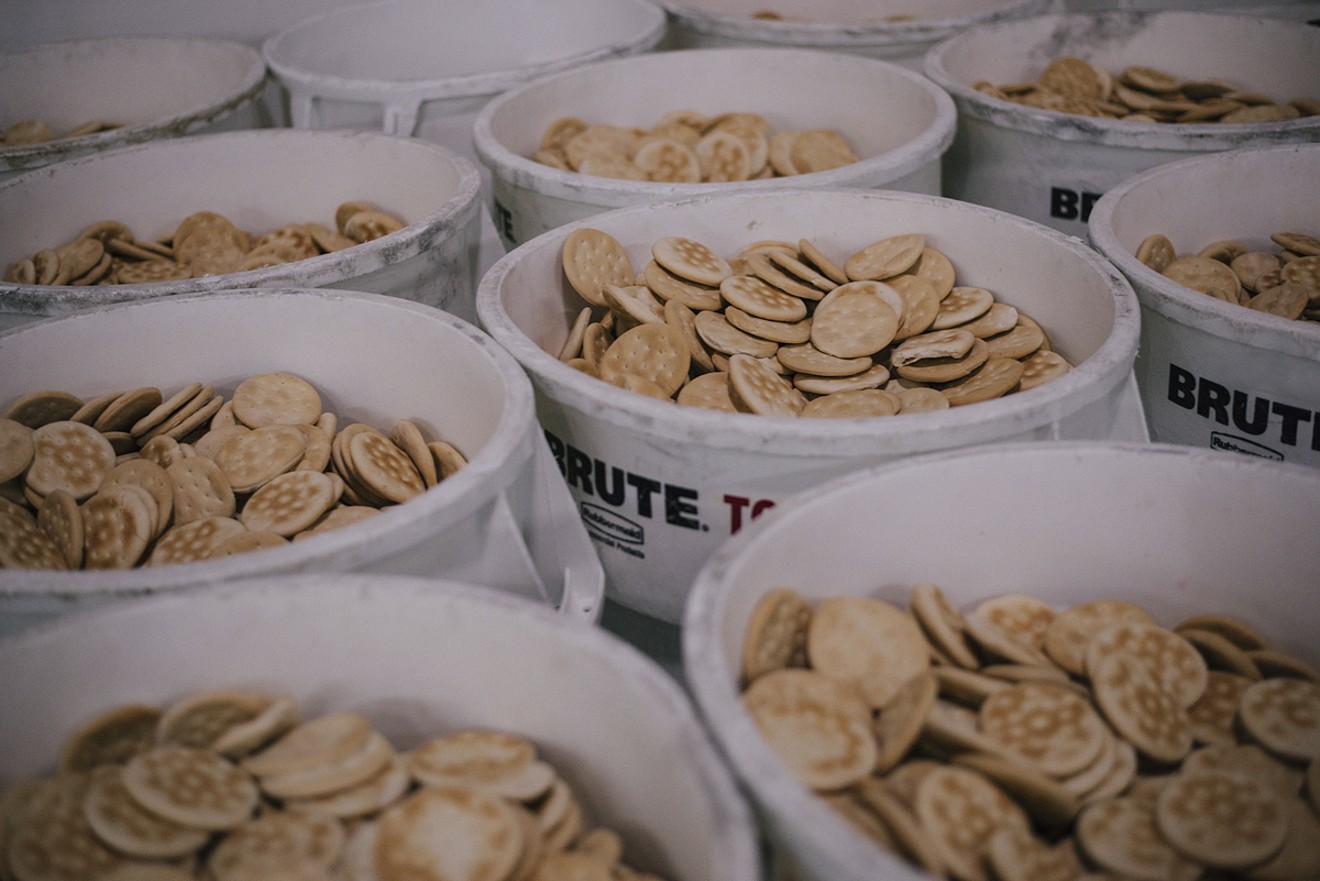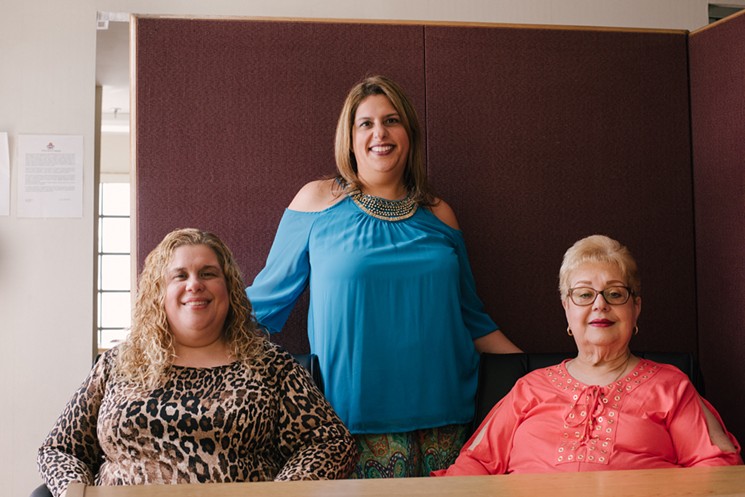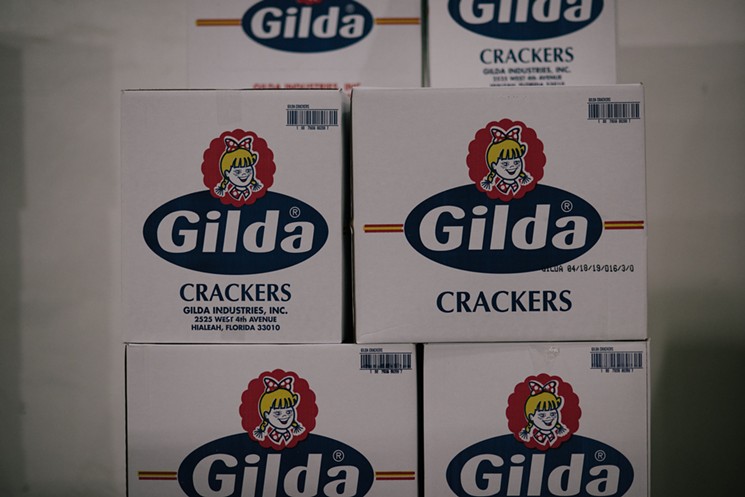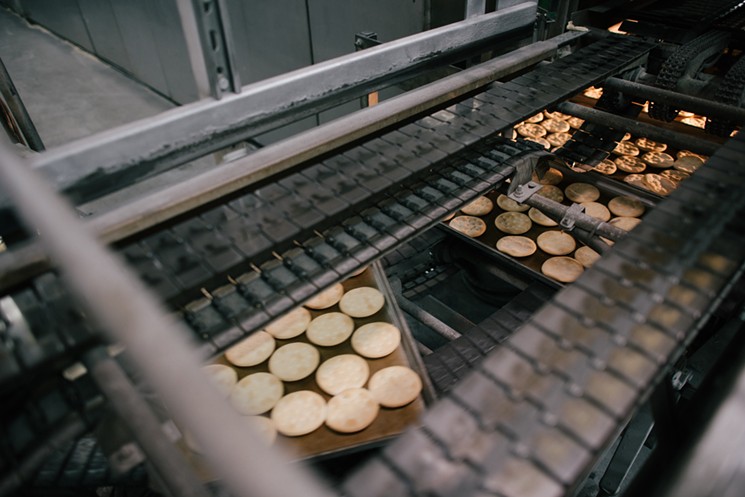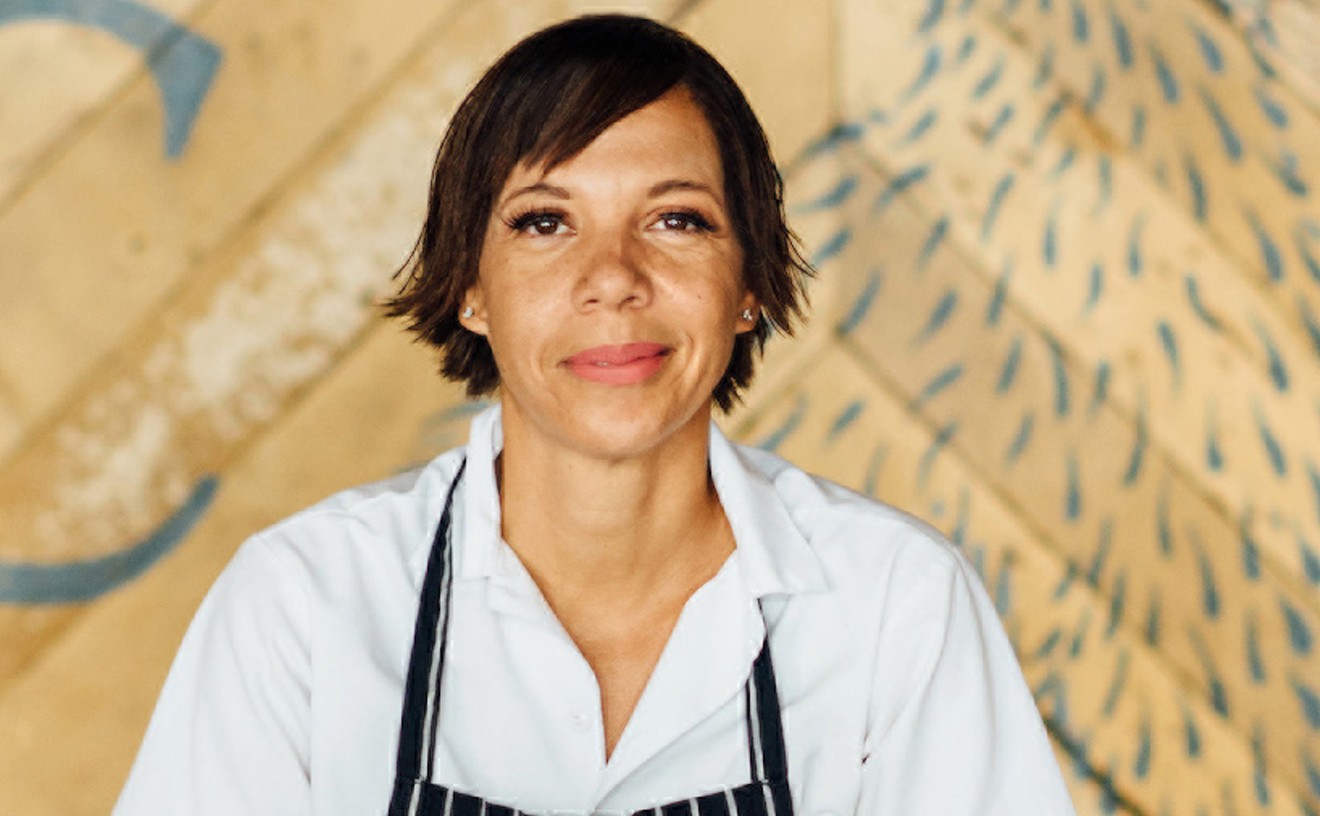A blast of heat greets everyone who steps onto the floor of Gilda Industries Inc.'s factory at 2525 W. Fourth Ave. in Hialeah. Overhead, tens of thousands of crackers, otherwise known as galletas and not to be confused with the sweeter cookies of a similar name, zip by on conveyor belts. They're pressed, stretched, flattened, and then fed into a 600-degree oven four at a time.
"The oven can take about 50,000 crackers at once," plant supervisor Mayerlin Blazquez shouts over the roar. "We make enough in eight hours to fill 25 shipping containers."
Cuban crackers are one of the island's — and Miami's — most basic food traditions. The owners of two bakeries, Gilda Industries and La Rosa on Calle Ocho, have survived starvation, prison camps, and decades of exile to preserve that tradition. These days, they're struggling with a general drop-off in the industry that has followed the ubiquitous American desire to cut carbs and eat healthier food.
Crackers were part of life in Cuba almost from the moment on October 28, 1492, that Columbus' sea-weary sailors docked in today's province of Holguín, not far from where the Gilda Industries plant was built four and a half centuries later.
Even before the trip, the explorers had learned their bread didn't take long to spoil. Around the time of Columbus, each sailor was allotted a pound and a half of crackers Mondays, Wednesdays, Fridays, and Saturdays, according to author Pablo Emilio Pérez-Mallaína Bueno. Those early crackers were made with olive oil, which was too rare and expensive to use in the Caribbean, so bakers switched to lard.
"They used to put salt on top too," laughs Velma Blazquez, wife of Gilda Industries founder Juan and mother of Mayerlin. "Much tastier, but definitely not good for you."
Juan, now 78 and battling dementia, began baking and selling crackers in Holguín in the early 1940s. "They only had one truck and often delivered tin cans filled with crackers down dirt roads," recalls Velma, who is 71 and now chief guardian of the family story.
By the 1950s, Juan's bakery was thriving and selling crackers across the eastern end of the island, while family members enjoyed similar success in Havana and nearby Oriente. It all came crashing down after Fidel Castro's 1959 revolution, when the government and army took over the factories and trucks. In the early 1960s, Juan boarded a plane bound for Miami. Once here, he and hundreds of other refugees hatched plans to retake their homeland. But 1,200 of them were captured near the Bay of Pigs after President John Kennedy failed to provide air support to the CIA-backed invasion.
Juan spent nearly three years in prison. His wife says he wasn't tortured, but he emerged nearly a skeleton. "They kept them like pigs, all nude, with one bucket for 300 men," she says. "All they fed him was the dirt and roaches."
"With spaghetti," adds Jeannice Blazquez, his 43-year-old daughter and now Gilda's vice president. "He couldn't touch spaghetti."
"We're working on organic crackers. This is what people are demanding."
tweet this
After his release, Juan opened a factory in Honduras. In 1963, he returned to Miami and opened Gilda's first facility just around the block from the decade-old factory his daughter Mayerlin manages today.
Today Gilda Industries ships nearly 70 kinds of product, mostly crackers, to locations up and down the East Coast. The family plans to push into Central and Latin America in the next two years. Each week, the Hialeah factory sends out about ten shipping containers of crackers, more than double the number it did three years ago.
Across town, La Rosa Bakery (4259 W. Flagler St., Miami; 305-443-2113) turns out its own galletas on a smaller scale. Each day, owner Osvaldo Mayoral, who's in his ninth decade, shows up for work wearing a collared blue shirt and a paper hat to run the bakery from a meticulously kept office. La Rosa produces big, rich-tasting crackers with a crisp-crumbly texture that are much softer than those from larger operations. His great-grandfather emigrated from Barcelona to Cuba in the late 19th Century.
"It said 'cook' on his immigration papers," Mayoral says. Food was the family business. Growing up in the seaside town of Caibarién, Mayoral remembers crackers being a constant. "They called them galletas de marinero," he says. "They're a bit thicker and bigger than what we sell here."
As one of nine siblings in a family where all the boys were bakers, Mayoral worked in bakeries along the more than 200-mile road from his hometown to Havana. Eventually, he, his five brothers, and his father owned a bakery called El Gran Paris in the capital. Then, in 1962, the Communist government summoned the men to Pinar del Río in far western Cuba and told them they'd have to reapply for their jobs at a salary of 500 pesos per month, about $18.87 in today's money. When they returned home, the brothers found the bakery had been given to their former employees. They stayed another five years, nearing starvation, and then headed for Miami on a freedom flight in 1967.
"Sometimes the only thing to buy was fish heads for soup," recalls Osvaldo's daughter Flor, who was born in Cuba. "When we arrived here, I said, 'I'm not eating any more soup.'"
Once in Miami, Osvaldo and his brothers began working together again, this time at a cracker factory called La Rosa on LeJeune Road at NW 22nd Avenue. Eventually, the owners brought the Mayorals on as partners at a new bakery of the same name. Osvaldo would arrive daily at 3 p.m. and bake for the next 12 hours. His wife Mercedes, now 84 and still working in the bakery, would arrive at 7 a.m. to pick up the day's pastries and crackers before delivering them around town.
By the '80s, the business had become so successful the Mayorals opened a second location, on Sunset Drive at Galloway Road.
Today a seemingly endless stream of hot loaves of Cuban bread makes its way out of the bakery alongside dozens of pastries and crackers. Here, the crackers are larger and richer-tasting than those sold by bigger operations.
"It's flour, yeast, lard, salt, and the desire to work," Mayoral says, stern-faced before cracking a quick smile.
Though the elder Mayorals remain the face of La Rosa, they are preparing to pass on the business. Osvaldo still holds the details of the recipe close and hasn't yet shared it with anyone. One of his grandsons, Michael Nuñez, is preparing to take over. Another grandson, Andres Vega, works with the popular Sansara pop-up that has been regularly taking over Tinta y Café on Ponce de Leon Boulevard at the northern edge of Coral Gables, where he puts clever Cuban spins on brunch, such as eggs Benedict with a Cuban-cracker bun, and dinner.
Both families' greatest challenge are changing eating habits, which have led to a long-term decline in cracker sales. Last year, sales of Keebler's saltines slipped nearly 10 percent, while sales of Goldfish crackers plummeted by almost a fifth, according to a report in Food Business News.
"We're working on whole-wheat crackers, organic crackers," Jeannice says of Gilda's plans. "This is what people are demanding."
At the same time, the Blazquezes are scrambling to reconfigure their recipe, because many in the baking industry expect a ban on potassium bromate, a flour additive that helps dough rise but is also carcinogenic.
Gilda Industries seems to have mostly met this challenge. The Blazquezes plan to expand soon to a second facility, where they just might re-create the original recipe. "The market for those original crackers isn't as large as it once was," Mayerlin says as she finishes walking through the factory, "but there are still people out there who love them and still want them."

